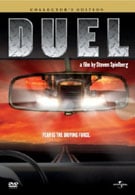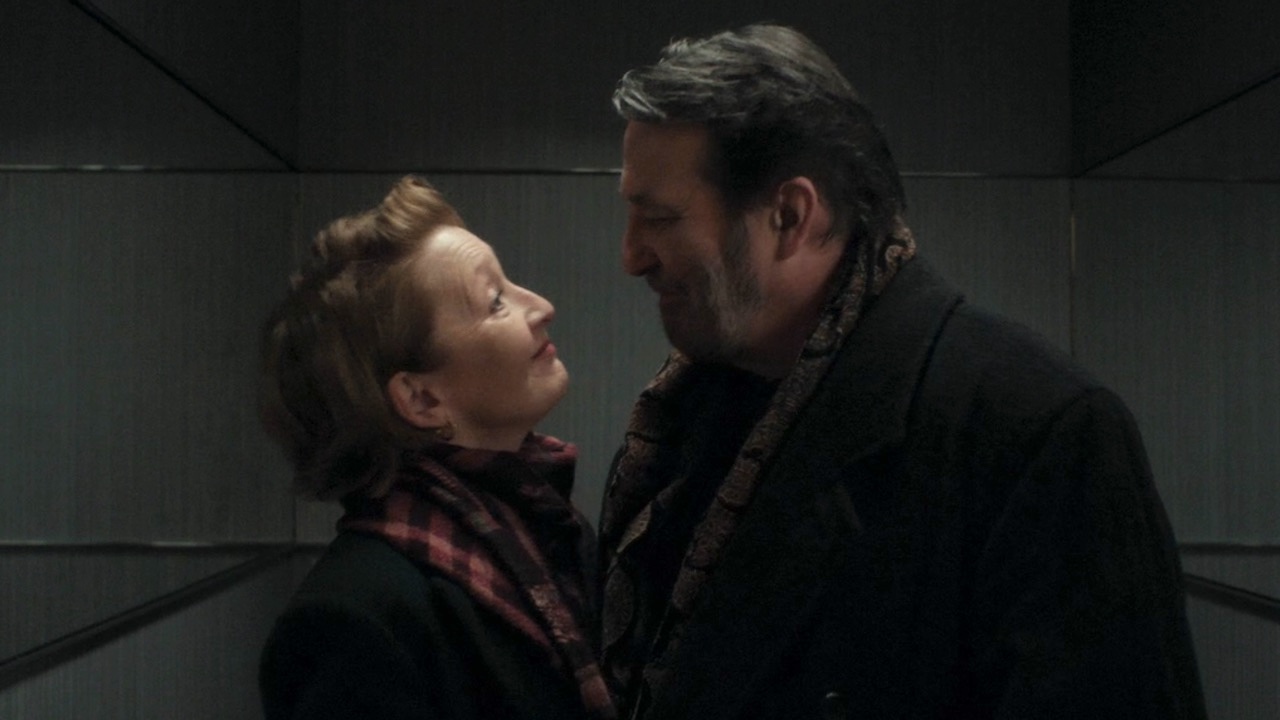Before the shark. Before the archeologist. Even before the beard, there was Duel. I remember the world of network “movies of the week”. A phenomenon that has burned out, Saturday nights used to be relegated to movie night on network television in an effort to capture some ratings on a night when most people were going out. Sometimes the movies were failed pilots, other times they were topical based on world events (it would sometimes be a race to see who could make a movie about the most recent scandal first). Often the movies would feature stars of the network’s popular shows. Most of the time these movies were nothing spectacular, but sometimes you’d find a diamond in the rough. Duel is one of those diamonds, and it started future uber-director Steven Spielberg on his promising career.
The premise of Duel is simple. A man, driving on a business trip, is terrorized by a fuel tanker that seems hell bent on killing him. That’s it. When you put it like that, it doesn’t seem like it would be capable of maintaining any sort of audience through 90 minutes of screen time. However it not only manages to hold the interest of the audience, but it captivates them to continue watching in anticipation of what comes next. It’s almost literally the equivalent of watching a train wreck, only with cars. That ability to captivate the audience is a huge credit, not only to Spielberg’s budding abilities as a director, but for the entire movie making process from script to screen.
The original story of the man being terrorized by the truck feels very much like an episode of “The Twilight Zone”. One moment everything is fine; the man is on his way to a business meeting. The next moment there’s an 18-wheeler attempting to kill him. Part of the reason for that feeling is due to Richard Matheson, who penned the original story (which appeared in Playboy Magazine) and adapted the story for the screen. Matheson has written for all three versions of “The Twilight Zone” over the years, as well as The Twilight Zone: The Movie. The psychological aspect of the movie, which is what helps drive the story, feels very similar to Matheson’s “Nightmare at 20,000 Feet” which fans may remember starred William Shatner (and later John Lithgow for the movie version) as a man terrified while flying. Both stories take place in small quarters (the cabin of a plane and inside a car) where someone is mentally trying to reconcile what should be normal in their situation against the strange situation they actually find themselves in.
In Duel that person is David Mann excellently played by Dennis Weaver. Weaver has the daunting task of playing a character that starts off a bit cocky and unravels throughout the 90-minute film, without really having anyone to play against. Sure he gets to speak to himself, but most of his acting isn’t done with his voice, but rather his eyes. Weaver’s eyes show his pride, confusion, and terror as the movie progresses. It’s really amazing to watch an actor do so much with so little.
As we’ve seen in other films though, you can have the best cast and script and still have a movie fall apart without decent direction. In someone else’s hands this could have been a boring film about a man driving around with a truck pursuing him. Instead, Spielberg gives the film a touch of genius, capturing the heart of Matheson’s script, and foreshadowing the accomplishments his early career would achieve with hits like Jaws and Poltergeist. Duel shows Spielberg as a storyteller with a base story to work with, instead of the special-effects extravaganzas he produces now. This movie is the perfect example of why I seldom discount Spielberg’s work because of the special effects. From his early days Spielberg has known at the heart of his movie has to be a good story, and whether that story is a man being tormented by a truck or a con-man on the run, Spielberg knows how to find that story and does his best job at telling it.
A movie like Duel with its low budget and simple story probably wouldn’t succeed in being told today. That’s unfortunate because there is a certain elegance to its simplicity. The story is told as well as it can be. There’s no danger of someone trying to remake this or rehash it into something else because what it is, it is (ugly ‘70s clothing and all). Maybe we should look for more films that achieve this sort of perfection and yet remain so simple. Duel was shot over twelve days in 1971 and released as a made for TV movie. With such a short production schedule, and since nobody knew the budding genius they had in their midst, there aren’t really any documentaries or behind the scenes featurettes for that time. Usually I frown on DVDs that strictly use retrospective material, but in this case, with only a trailer from the film’s time period, there wasn’t much of a choice.
The good news is the retrospective material is really good. A documentary on making Duel features Spielberg remembering those days with some fondness. Either Spielberg has the memory of an elephant or did research to remind himself of the production, because he really has his details down pat. Through the almost 40 minute documentary (almost half as long as the film itself) the director talks about his early days in television, getting the chance to make the movie, fighting for the right to film on location rather then filming in a studio and matting everything in, planning out how to film with an overview of the road they were using (rather then storyboarding the film), and the success of the film. Duel found so much popularity on television that it eventually was moved to the big screen. Since the telefilm was only 70 minutes long, they had to go out and film some new footage to extend it to the 90 minute minimum for theaters, thus making Duel one of the first “extended editions” Spielberg would work on.
Your Daily Blend of Entertainment News
One of the things about Spielberg’s interview that I found most interesting was his acknowledgement that he could not make this film today in the same way he did then. He was so hungry as a filmmaker then, eager to get his hands on anything, that he was able to find a way to film the movie in such a short amount of time. He knows he couldn’t do something that simple now, and at the same time he acknowledges he couldn’t have made Schindler’s List at that time. As he’s grown as a person doors have both opened and closed for him. I think it’s a very wise observation by one of Hollywood’s best.
In “The Writing of Duel”, Richard Matheson discusses his story and the process it went through. Inspired by a somewhat crazy truck that wanted to pass Matheson on the road, his attempts to sell the story as a script failed. Matheson found success writing the story as a short, and then ended up adapting that for the screen after all. He speaks briefly on what Spielberg brought to the story and moments in the movie that he was impressed with both from his story and Spielberg’s direction.
Other extras include a third featurette focusing specifically on Spielberg’s days in television, a photo gallery, and production notes on the movie along with information on cast and crew. It’s a decent amount of information and extras on what was originally a 70-minute made for television movie.
Duel is probably the most overlooked of Spielberg’s films and that’s a shame. It’s quite enjoyable and this is a great DVD release with a great version of the film (complete with 5.1 DTS or Dolby Digital) and a good amount of high quality extras. For anyone who wants to see how Spielberg started, or just wants to enjoy a vehicular thriller, Duel will be a good flick to pick up.

